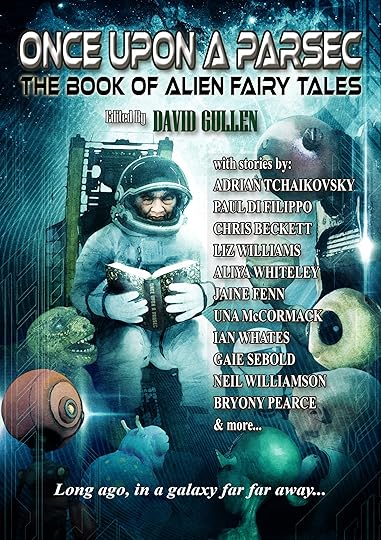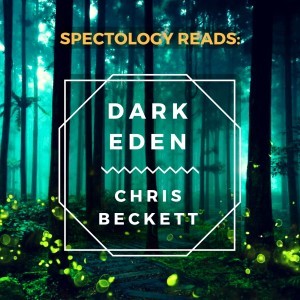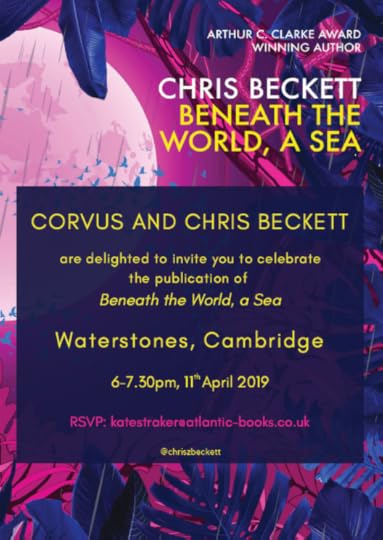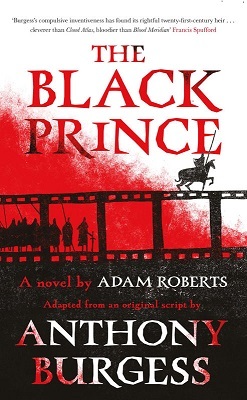Chris Beckett's Blog, page 11
June 17, 2019
The Land of Grunts and Squeaks
In the anthology, Once Upon a Parsec, edited by David Gullen and published by Newcon Press in June 2019.

May 15, 2019
Good Vibrations
Once in a while I go back to the songs of Brian Wilson, and remember again just how good they are. On one level they’re simply seductive pop songs, albeit full of detail and invention, but the best of them transcend their outer form altogether and are touched with a sublime grace that no one else seems to match. There is nothing else in pop music, for instance (or in anything else), that is remotely like Good Vibrations, and if that’s true of Good Vibrations it’s ten times as true of the utterly extraordinary Surf’s Up, with its strange, cryptic lyrics by Van Dyke Parkes. (See also the solo demo of the song performed by Brian Wilson alone).
April 21, 2019
Audio version of The Peacock Cloak
George Hrab has recorded an audio version of my story ‘The Peacock Cloak’ (a particular favourite of mine), here on Starship Sofa.
April 2, 2019
Podcast discussions of Dark Eden (and an interview)

Spectology have recorded not one but two very detailed discussions of Dark Eden. The ‘pre-read’ discussion is here. The ‘post-read’ discussion (i.e. the one in which spoilers are allowed) is here. They like the book a lot, which I’m obviously delighted about.
Following these two podcasts, Adrian from Spectology did an additional podcast in the form of an interview with me, which you can find here.
Podcast discussion of Dark Eden

Spectology have recorded not one but two very detailed discussions of Dark Eden. The ‘pre-read’ discussion is here. The ‘post-read’ discussion (i.e. the one in which spoilers are allowed) is here. They like the book a lot, which I’m obviously delighted about.
Podcast discussion of Dark
Spectology have done a very interesting and detailed discussion of Dark Eden here. (Also they like it a lot, which is nice.) There will be a second post-read installment.
March 15, 2019
Launch events for Beneath the World, a Sea
Beneath the World, a Sea comes as an ebook and in hardback on April 4th.
(1) April 6th, 1-2pm, I’ll be signing at Forbidden Planet, Burleigh St, Cambridge.
(2) April 9th, 7-9pm, at Waterstones, Norwich (follow link for ticket information), I’ll be talking Beneath the World, a Sea, with the great Tony Ballantyne.
(3) April 11th, 6-7.30, at Waterstones, Cambridge, a launch celebration (please RSVP as per invite below).

February 28, 2019
Event in Norwich
I’ll be at Waterstones in Norwich on April 9th, talking about my new book, Beneath the World, a Sea, with the great Tony Ballantyne. There will be another launch event in Cambridge, and possibly others too, so watch this space.
The rivers swarm with fish
Sometimes a piece of writing that presumably wasn’t intended to be poetic at all has a poetry all of its own. The following is the section on flaura and fauna from the Wikipedia entry for the Russian island of Sakhalin. (Why was I looking at the entry for Sakhalin? Because, like Judith Schalansky, I love to go to islands in my imagination that I know I will never really visit. They too have a special poetry.)
The whole of the island is covered with dense forests, mostly coniferous. The Yezo (or Yeddo) spruce (Picea jezoensis), the Sakhalin fir (Abies sachalinensis) and the Dahurian larch (Larix gmelinii) are the chief trees; on the upper parts of the mountains are the Siberian dwarf pine (Pinus pumila) and the Kurile bamboo (Sasa kurilensis). Birches, both Siberian silver birch (Betula platyphylla) and Erman’s birch (B. ermanii), poplar, elm, bird cherry (Prunus padus), Japanese yew (Taxus cuspidata), and several willows are mixed with the conifers; while farther south the maple, rowan and oak, as also the Japanese Panax ricinifolium, the Amur cork tree (Phellodendron amurense), the Spindle (Euonymus macropterus) and the vine (Vitis thunbergii) make their appearance. The underwoods abound in berry-bearing plants (e.g. cloudberry, cranberry, crowberry, red whortleberry), red-berried elder (Sambucus racemosa), wild raspberry, and Spiraea.
Bears, foxes, otters, and sables are numerous, as are reindeer in the north, and musk deer, hares, squirrels, rats, and mice everywhere. The bird population is mostly the common east Siberian, but there are some endemic or near-endemic breeding species, notably the endangered Nordmann’s greenshank (Tringa guttifer) and the Sakhalin leaf warbler (Phylloscopus borealoides). The rivers swarm with fish, especially species of salmon (Oncorhynchus). Numerous whales visit the sea coast, including the critically endangered Western Pacific gray whale, for which the coast of Sakhalin is the only known feeding ground. Other endangered whale species known to occur in this area are the North Pacific right whale, the bowhead whale, and the beluga whale.
Beautiful!
February 26, 2019
The Black Prince

I find it quite difficult to immerse myself in a novel these days and often have to make myself keep turning the pages. (I don’t know whether is this me getting more fussy as I grow older, or whether perhaps it’s the business of writing fiction that makes it harder: I imagine a puppeteer finds it hard to surrender to the illusion of a puppet show). But never mind all that because I did find this book immersive, and read the whole thing very quickly and greedily.
This is a novel written by Adam Roberts, drawing on a film script and some notes by the late Anthony Burgess. I have to say that, in my opinion, the least successful parts of the book were the various interludes in the main action in the form of ‘news flashes’ and ‘camera’s eye’ views. In incorporating these, Roberts was being faithful to Burgess’ plan to make use of story-telling tricks invented by John Dos Passos. However I found them an unwanted distraction, and not really in keeping with the rest of the book, so that each time they came up I was impatient to get back to the main narrative. This, by contrast, I found entirely gripping.
Edward the Black Prince was the son of King Edward III and would have have been Edward IV if he hadn’t died before his father. He is famous as a warrior, defeating much larger French armies at the battles of Crecy and Poitiers, and as a kind of epitome of the chivalrous knight in armour. In fact, as this book shows, the wars he fought to expand and defend his father’s realms in France were incredibly bloody and brutal. In an age when ordinary people had absolutely no say in the decisions being made by their leaders, it was nevertheless considered perfectly acceptable, and perfectly consistent with the theological doctrine of ‘just war’, to hack to death the entire population of a town, including children and babies, if the leading figures in that town had chosen not to surrender promptly enough. (Since carpet bombing of cities remains a pretty standard weapon of war in modern times, I suppose we haven’t really changed in this respect. We just do our indiscriminate slaughtering from a sanitised distance which allows us to call it ‘collateral damage’).
The savage and gleeful butchery involved, particularly at the sack of Limoges, is described by Roberts in remorseless detail. I was going to say harrowing detail, but that actually wouldn’t be entirely honest, because the truth is (and I’m not proud of this, but I’m guessing I’m not alone) that I actually find this stuff quite engrossing, and even exciting, to read about. The end result was that I emerged from the book disturbed not only by the events described, but by my own troublingly ambiguous response. Which is surely as it should be, because these things are not perpetrated by monsters but by human beings, drawing on the same instincts, desires and fears as the rest of us.
On this same theme, Roberts does a great job of conveying the humanity of the Black Prince and the other characters, as they move between ruthless slaughter and the ordinary emotions of everyday life. A professional mercenary for example, who fights and kills for plunder, grieves over his much-loved wife and regrets that he didn’t treat her better when she was alive. Occasionally characters feel some unease about what to us seem their most obvious sins, the industrial-scale killings in which they’ve been engaged, but they are human beings and have all kinds of defences and justifications that prevent them from worrying about these things for too long, much as we have defences, I suppose, that prevent us from worrying for any length of time about the exploitative sweat shops where people build the digital toys we play with, or the dangerous mines where the minerals for them are extracted.
One strand that was particularly fascinating was the Black Prince’s preoccupation with the Holy Spirit, and what that meant. As I gather from other writings of his, Roberts is not a believer in the Christian religion but nevertheless finds Christian theology fascinating and imaginatively engaging (a description that could be applied to me too and, from what I understand, also to Anthony Burgess). And it is by exploring this idea of the Holy Spirit that he lifts this book from being merely a grim catalogue of human cruelty into something more profound and even a little bit hopeful.
[image error]
Chris Beckett's Blog
- Chris Beckett's profile
- 348 followers



